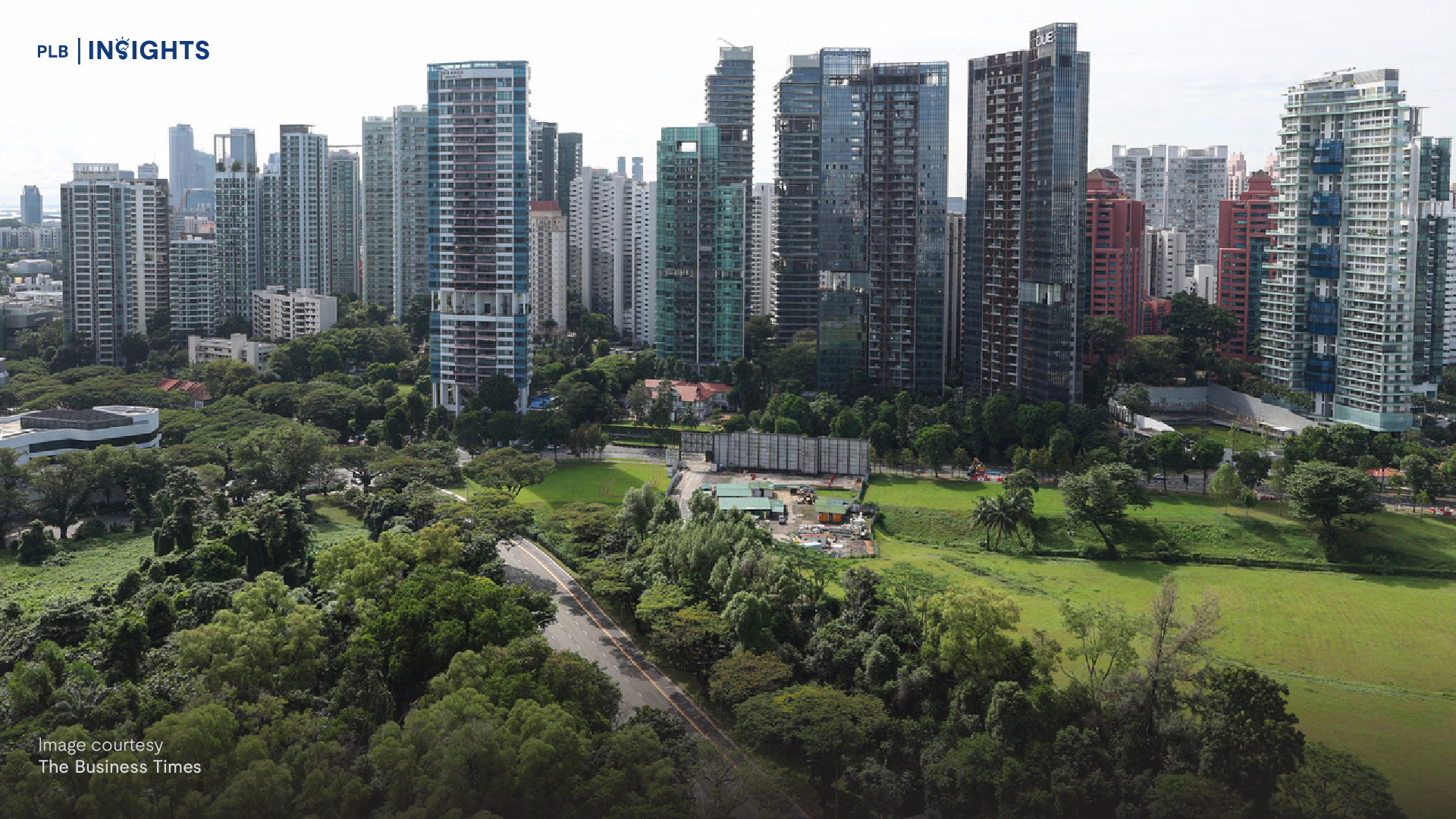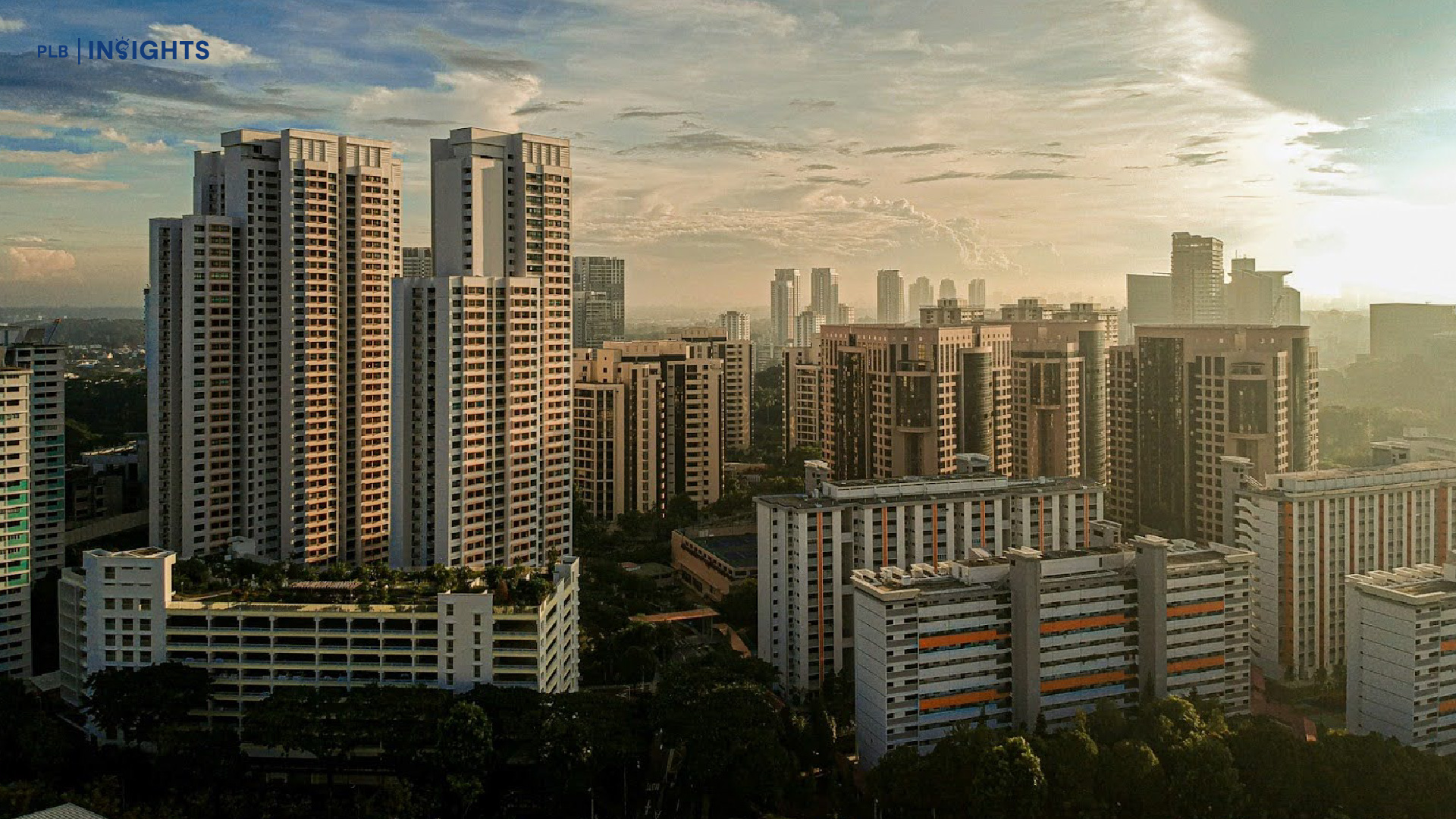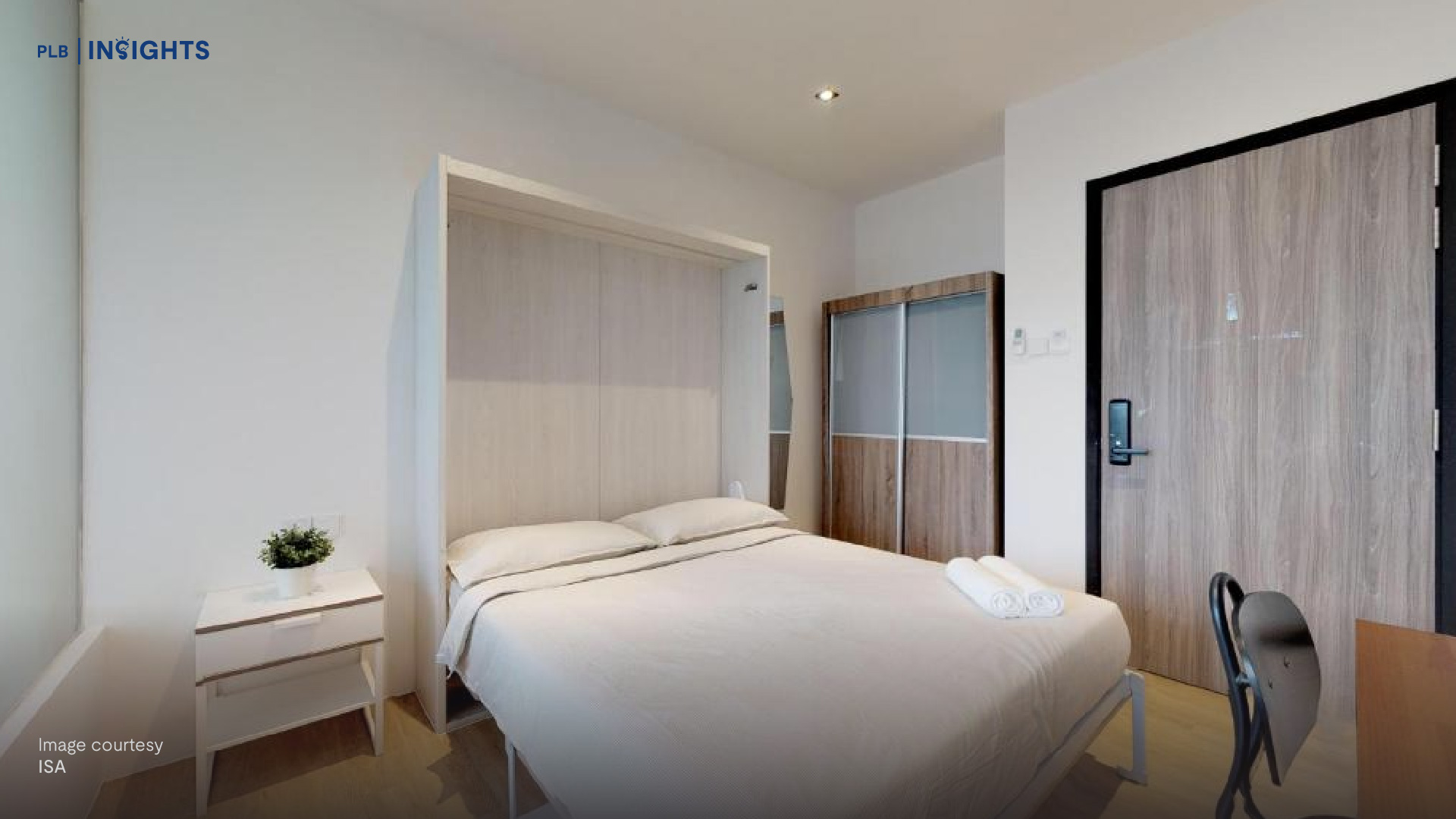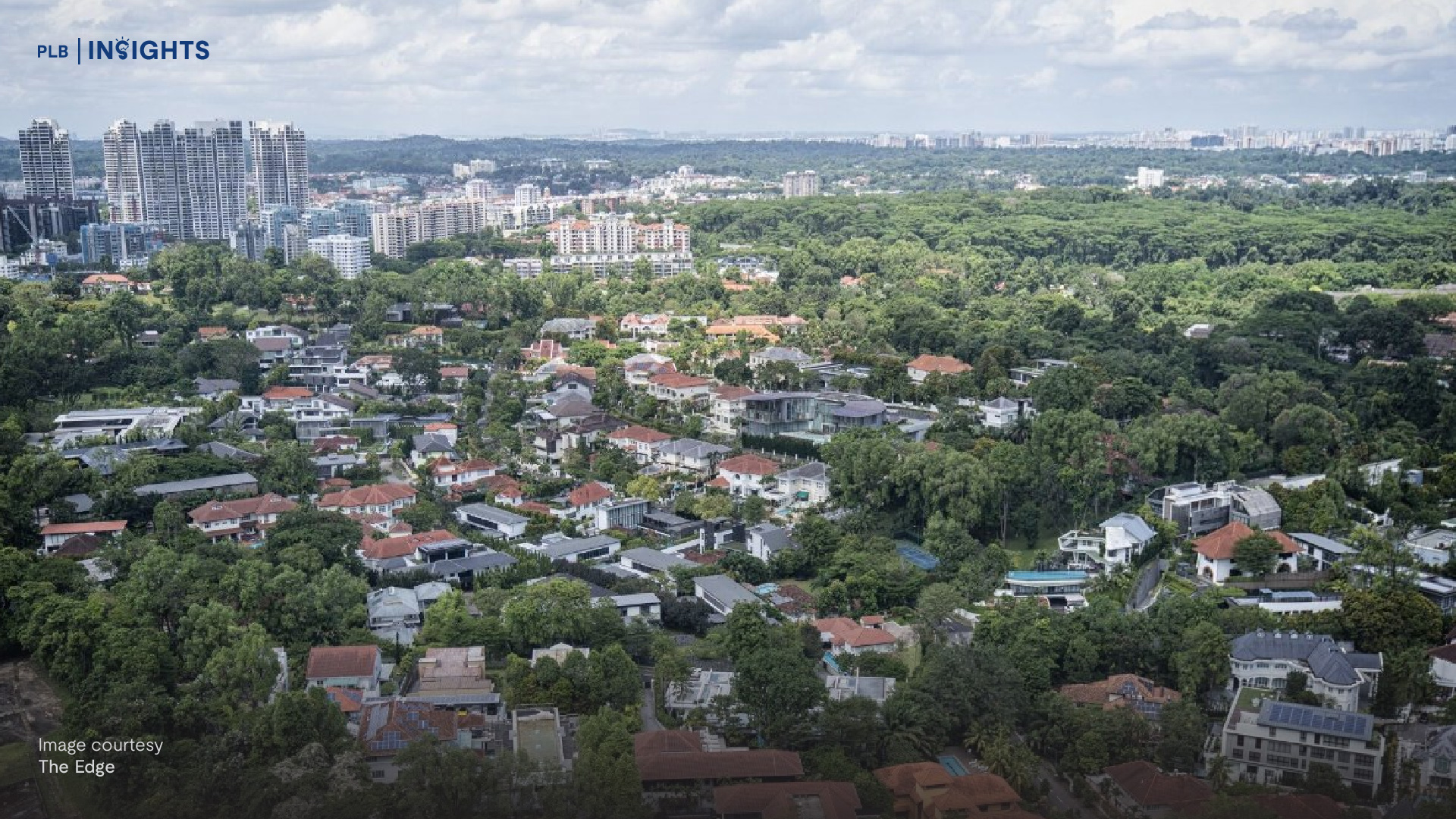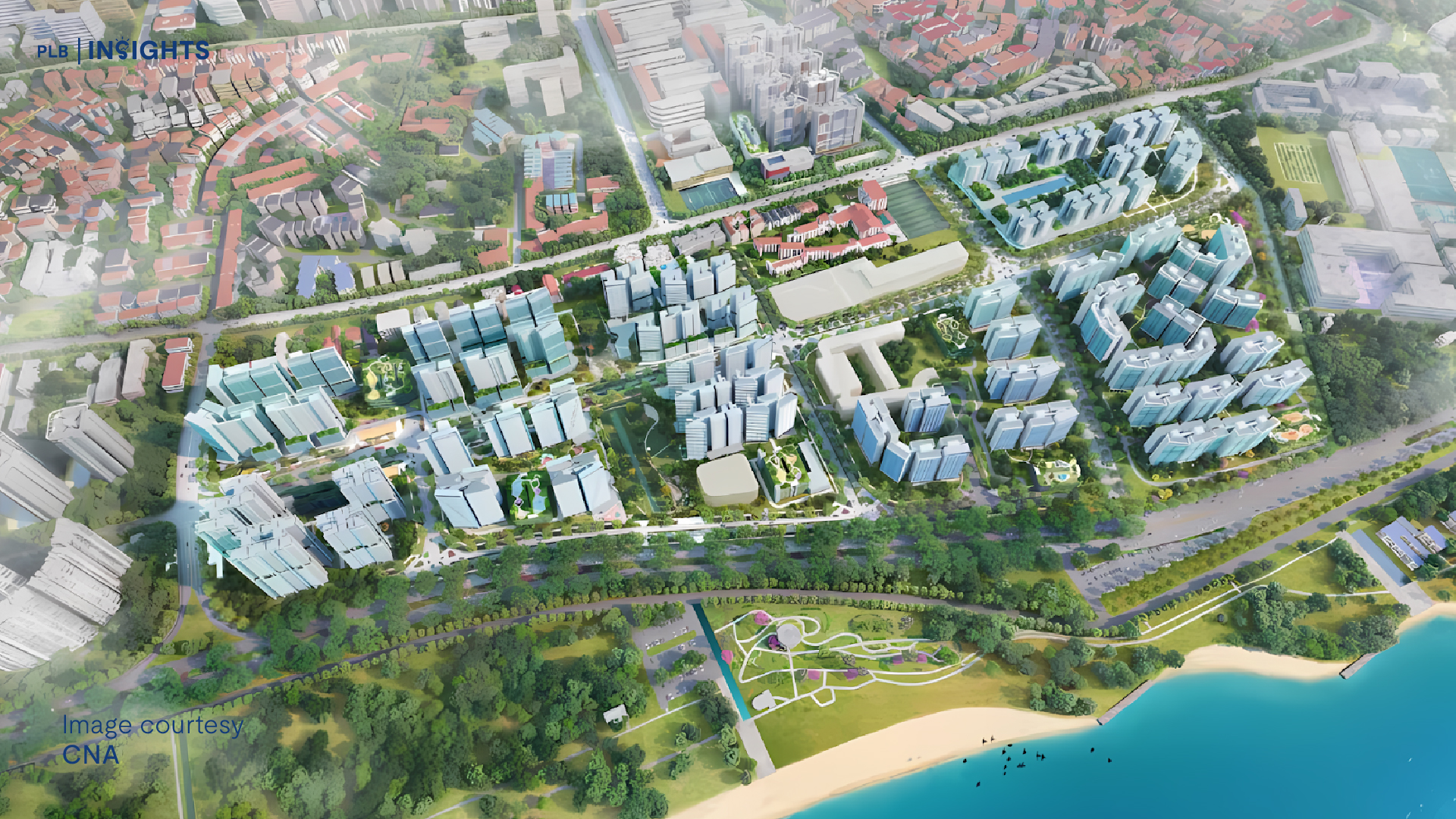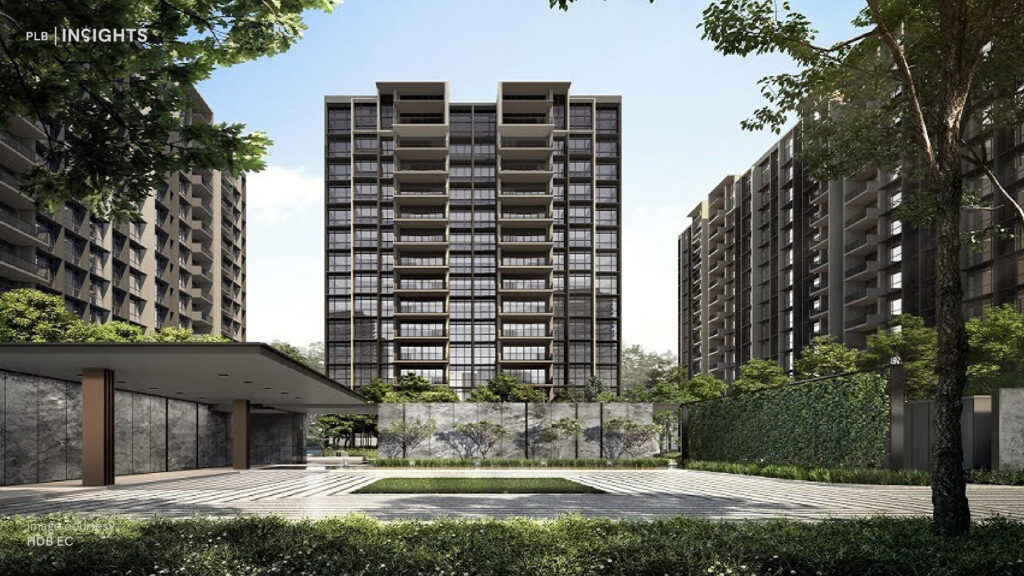
The Executive Condominium (EC) market in Singapore has seen significant growth over recent years, with prices climbing due to limited supply and high demand from middle-income families seeking an affordable bridge to private homeownership. Newly launched ECs averaged a price of $1,460 per square foot (PSF) for the first nine months of 2024, marking a 24.1% increase from $1,176 PSF in 2021. More than half of recent transactions exceed the $1,500 PSF mark, with some units reaching prices comparable to private condominiums. The highest sale this year was a unit at Parc Central Residences in Tampines, which sold for $1.6 million, or $1,680 PSF, in March 2024. As a result, these developments, once an affordable alternative, are gradually becoming less accessible to their target demographic.
Novo Place, a new EC launching in Tengah’s Plantation District, reflects the upward trend in EC prices, with units starting at $1.3 million for a 3-bedroom. Located near the upcoming Tengah Park MRT station and close to the future Jurong Lake District, Novo Place is poised to attract strong interest from buyers looking to gain a ‘first-mover advantage’ in this growing township. This development exemplifies how ECs in emerging areas benefit from capital appreciation potential as the area matures. However, as EC prices rise, middle-income families may find themselves facing affordability constraints due to the $16,000 income ceiling, which was last adjusted in 2019.
Why ECs Are a Hot Commodity: Demand, Returns, and Long-Term Value
The EC market consistently attracts strong demand, especially for resale units reaching the Minimum Occupation Period (MOP). Many owners choose to sell soon after MOP, taking advantage of high demand and limited supply, which drives rapid price appreciation. On average, ECs sold within the first year post-MOP can achieve annualised returns of up to 5.74%. This trend highlights ECs as valuable investments for immediate and long-term gains.
The appeal of ECs as an asset is not limited to the initial MOP period. Owners who retain their units through the full privatisation phase can attract a broader pool of buyers, including foreign investors, which enhances capital growth due to broader demand and factors such as inflation, economic growth, and nearby infrastructure improvements. For families viewing ECs as both homes and financial assets, these developments offer stability and long-term value, with peaks in returns immediately post-MOP and upon full privatisation.
ECs as a Preferred Option for HDB Upgraders

The EC model remains particularly attractive for HDB upgraders, as they are able to avoid paying the Additional Buyer’s Stamp Duty (ABSD). This is possible because HDB upgraders are required to sell their existing flat within six months of receiving the keys to their new EC, allowing them to sidestep the ABSD typically incurred on a second property. Additionally, HDB upgraders can benefit from the Deferred Payment Scheme (DPS), which enables them to defer a significant portion of the payment until the project nears completion. While the DPS typically incurs a 2-3% premium on the overall quantum price, it reduces the financial strain of servicing two mortgages concurrently, making ECs a feasible choice for families transitioning from HDB flats to private-style living. This support, combined with the strong profitability of ECs, reinforces their appeal among second-time homebuyers and upgraders.
Rising Prices and the Income Ceiling: Can ECs Stay Accessible for Middle-Income Families?
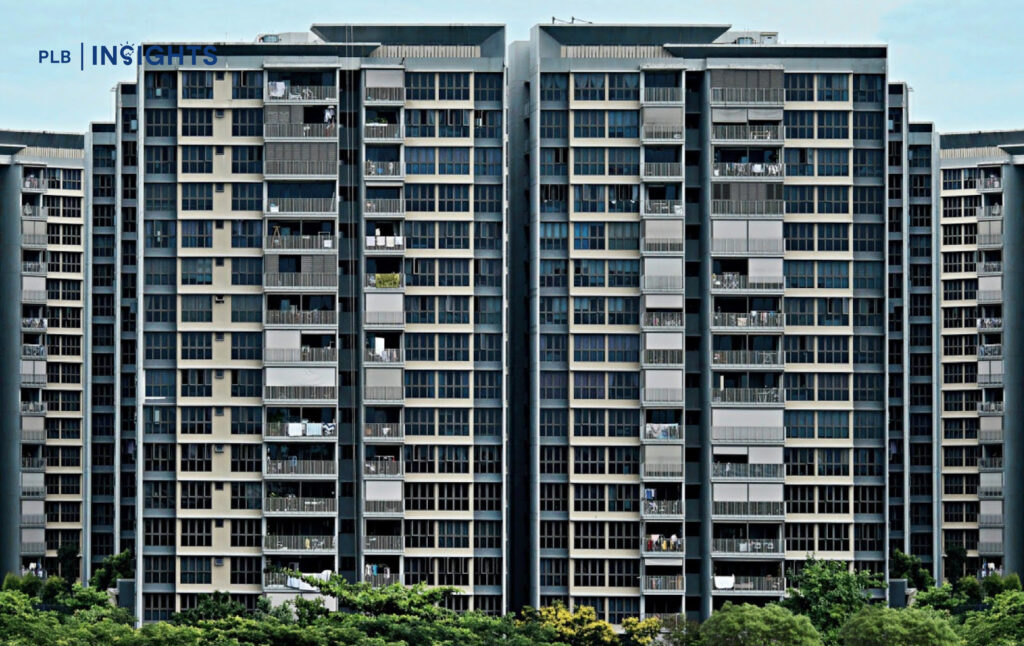
With rising EC prices, reconsidering the $16,000 income ceiling could help ensure it remains aligned with today’s market realities. Initially intended to limit ECs to middle-income households, this cap now restricts families who might otherwise benefit from this housing segment. An income ceiling adjustment would help ECs maintain accessibility for middle-income Singaporeans, keeping pace with the evolving property market. Several factors suggest the need for this revision:
Income and Loan Constraints
For EC buyers, financial caps, including the income ceiling and the Mortgage Servicing Ratio (MSR) framework, limit loan amounts, impacting their purchasing power. These measures help support affordability, but as EC prices climb, these financial caps can constrain the middle-income families they aim to serve. Without income ceiling adjustments, households that slightly exceed the $16,000 limit face difficulties qualifying for ECs, effectively narrowing their housing options. Given inflation and rising incomes, a reassessment of affordability measures, including income caps, would benefit families whose financial profiles now exceed the limit but who are not financially prepared to enter the private market.
Balancing Demand and Supply Dynamics
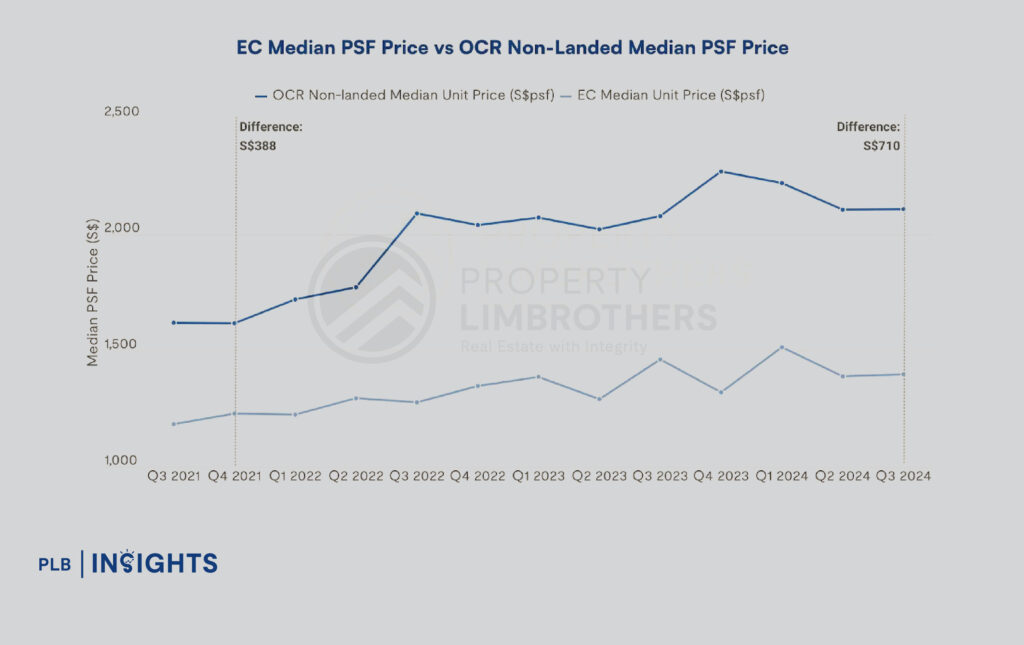
The demand-supply balance is tightly controlled in the EC market to sustain price growth and stability. ECs are released sparingly—typically between one to three sites a year—ensuring limited supply and helping preserve value for owners. An adjusted income ceiling could better distribute demand, particularly as buyers look to ECs for value and as an alternative to high-priced private condominiums in the Outside Central Region (OCR). While EC prices rise, the price gap with OCR private condos has widened from $388 PSF in Q4 2021 to $710 PSF in Q4 2024, highlighting ECs’ relative affordability as a more accessible option.
Comparative Value: ECs vs. Resale HDB Flats
For potential buyers, comparing ECs to million-dollar resale HDB flats in central areas may bring further clarity. Resale flats can offer the appeal of a prime location, with larger units in central or well-connected areas, but new ECs bring long-term advantages. ECs offer a fresh 99-year lease, modern amenities, and potentially connectivity to MRT stations, enhancing appeal as the infrastructure in these developing areas matures.
Additionally, while resale HDB flats may come with shorter lease tenures and potentially more costly renovation, ECs generally present lower maintenance needs and avoid hidden costs associated with older HDB flats.
Case In Point: Novo Place and the Future of EC Developments
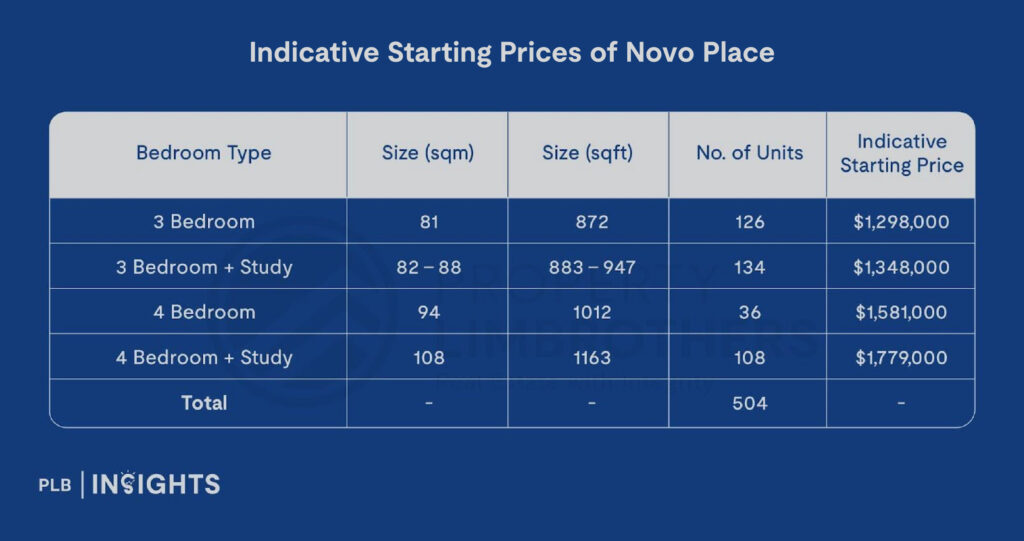
Novo Place represents the next generation of ECs, combining high-end features with a strategic location near the Tengah Park MRT station. With prices starting at $1.298 million for a 3-bedroom unit, Novo Place is expected to attract buyers seeking both lifestyle amenities and long-term investment potential.
Yet, its price point raises questions about the $16,000 income ceiling, which has become increasingly restrictive for middle-income families as EC prices rise. Buyers near or slightly above the income limit may find themselves limited, particularly as the price gap between ECs and private condos continues to close. Novo Place’s anticipated demand underscores the appeal of ECs, while also emphasising the need for policy measures to keep these homes accessible to middle-income Singaporeans.
How Much Income is Needed to Afford an EC?
With EC prices steadily rising, it’s essential to understand the income requirement to purchase an EC in Singapore’s current market. For this example, we’ll assume a typical 3-Bedroom EC priced at $1.4 million, as recent new launch 3-Bedroom EC units (Lumina Grand, Altura) are transacted in this range. Additionally, we’ll assume an interest rate of 2.5% per annum for the mortgage, spread across a 25-year tenure.
This calculation will help prospective buyers gauge the minimum income needed to afford an EC at this price point while adhering to regulatory requirements, such as the Mortgage Servicing Ratio (MSR), Total Debt Servicing Ratio (TDSR), and the HDB resale levy for second-time buyers.
Here’s the breakdown:
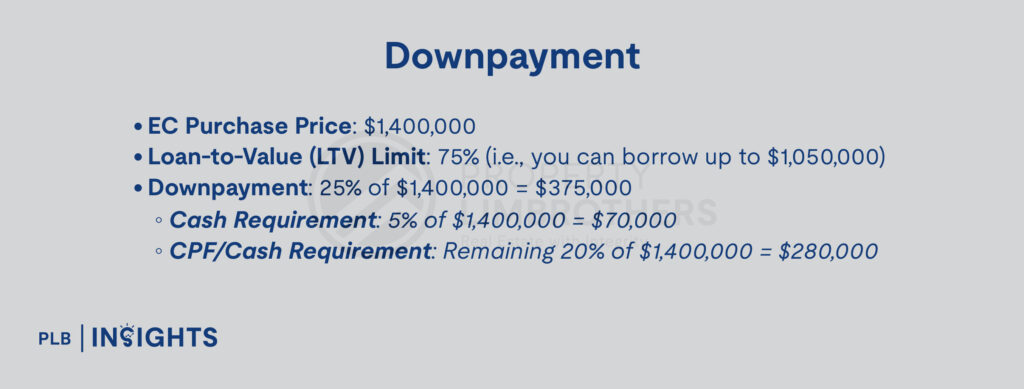
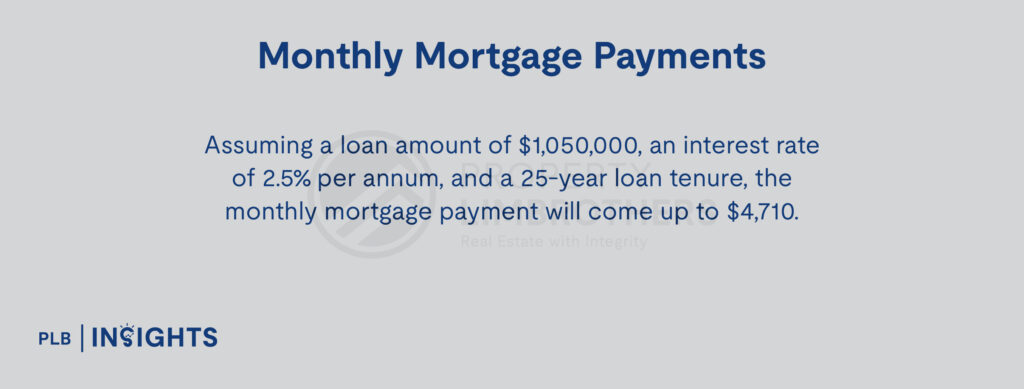
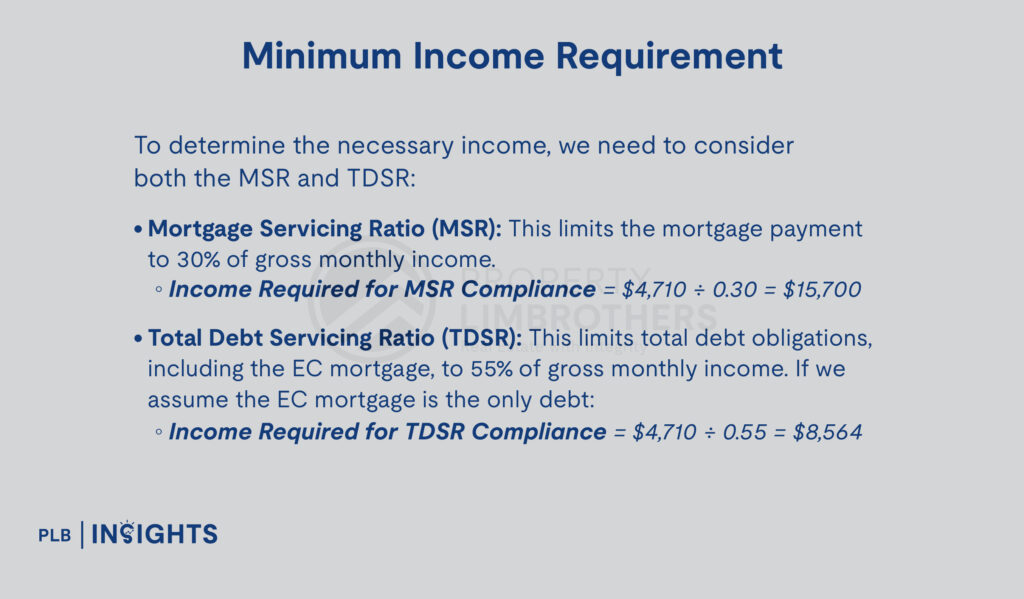
In this case, the MSR requirement is more restrictive, so the minimum household income needed is approximately $15,700 per month to stay within the 30% MSR cap. This income level is just shy of the current $16,000 ceiling, meaning that families looking to purchase larger or pricier units may face challenges meeting the downpayment without substantial cash savings or cash proceeds from their previous property. This further underscores the potential need for a revision to ensure ECs remain accessible to middle-income families.
Although both MSR and TDSR apply to ECs, when the MSR is more restrictive, it effectively sets the maximum allowable loan, as buyers must satisfy both requirements to qualify for financing. In cases where the MSR cap results in a higher required income than the TDSR, buyers need to meet the MSR’s more stringent threshold to comply with regulations. If there are other significant debts, a higher income would be required to comply with the TDSR.
HDB Resale Levy for Second-Timers
If you’re a second-timer upgrading from a previously subsidised HDB flat, you will also need to account for the resale levy.
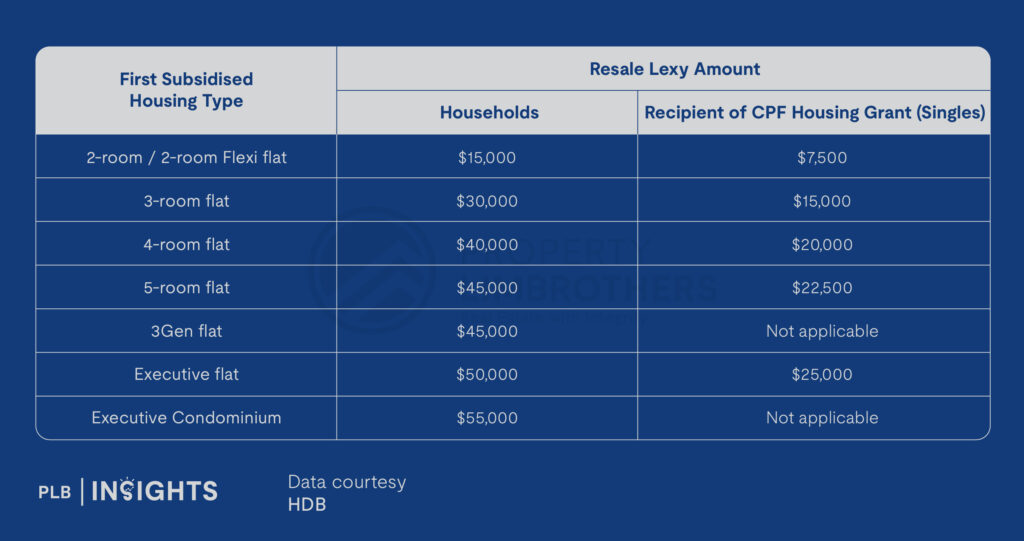
Advantages and Potential Downsides of Raising the Income Ceiling
Adjusting the income ceiling presents both benefits and challenges for the EC market.
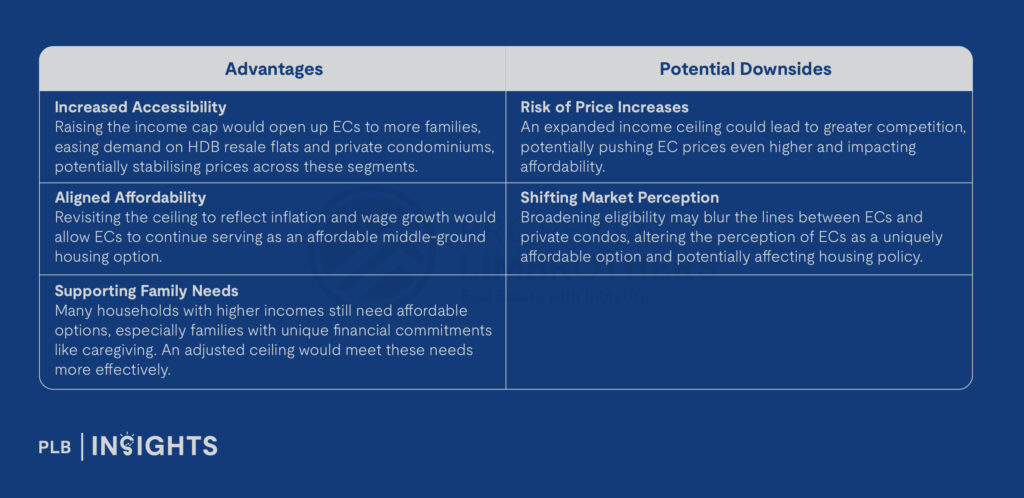
A Targeted Approach to Eligibility Adjustments
A balanced approach to revising the income ceiling is essential. Rather than a single, substantial increase, smaller, gradual adjustments or a tiered income structure based on household size and needs could keep ECs accessible without overwhelming demand. This approach would allow ECs to serve a broader demographic while minimising the risk of significant price inflation.
In Summary
Executive Condominiums are a critical component of Singapore’s housing market, offering an affordable option with the potential for capital appreciation. Yet, with rising prices, a stagnant income ceiling could exclude more families from accessing these valuable properties. Revisiting the income ceiling could ensure that ECs remain accessible to the middle-income households they are intended to serve, supporting both affordability and the property market’s stability.
A thoughtful approach, including periodic adjustments or tiered eligibility, could help ECs remain a viable and affordable option without destabilising the market. As the EC market evolves, their role in bridging public and private housing will grow, highlighting the importance of maintaining affordability within this essential housing segment.
Wondering how rising EC prices and income ceiling policies might impact your homeownership journey? Contact us today. Our experienced consultants are ready to guide you in finding the perfect home that fits your budget and lifestyle.
Disclaimer: Information provided on this website is general in nature and does not constitute financial advice or any buy or sell recommendations.
PropertyLimBrothers will endeavour to update the website as needed. However, information may change without notice and we do not guarantee the accuracy of information on the website, including information provided by third parties, at any particular time. Whilst every effort has been made to ensure that the information provided is accurate, individuals must not rely on this information to make a financial or investment decision. Before making any decision, we recommend you consult a financial planner or your bank to take into account your particular financial situation and individual needs. PropertyLimBrothers does not give any warranty as to the accuracy, reliability or completeness of information which is contained in this website. Except insofar as any liability under statute cannot be excluded, PropertyLimBrothers, its employees do not accept any liability for any error or omission on this web site or for any resulting loss or damage suffered by the recipient or any other person.

